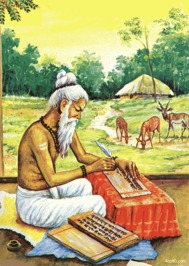
Sri Gurubhyo
namah!
SqeLla merIs!-klazala-mihlana<
sÉa< nmn!,
ÉasnaqktNÇaOy< ivv]e=h< ywamit.
Namaste students! Very good morning
to one and all present here to listen my lecture on Dramatic skills of Bhasa.
As you all are Sanskrit students, you will be
aware of the greatness of the Sanskrit Language - the ancient of all the world
languages. Sanskrit is rich with its
grammar and literature, added to it are the Vedas, Upanishads and many old
scriptures.
A language can
be special on its own the poets and writers of the language enhance their own
skills with the support and the grandeur of the language.
Many great
stalwarts of Sanskrit languages like Bhasa, Kalidasa, Magha, Bhartruhari,
Banabhatta, Jayadeva, Bhoja etc., have established their fame.
Bhasa has an
unique identity of his own, because of his dramatic skill with with
stage-management.
What do you
mean by drama?
Drama is a medium by
which one can express his/her emotions, thoughts, intentions to others. The Indian dramas have been a combination of
dance,music and mimetic representation.
Mainly these dramas were intended to give pleasure and delight to the audience. We can find the references from kaE;ItkI
äaü[m! as it is said-iÇv&d!
vE izLp< n&Ä< gIt< vaidtimit, In Vedic literature it
is said that the term izLp< denotes Musical dance
performance. Moreover, the phrase “n&Ä<
gIt< c vaidÇ< s¼Itkmudaùtm! ” suggests that Musical dance performances consisting of
these three elements dance, song and instrumental music.
kaildas> says in the drama titled malivkai¶imÇm!
that naq(m! / Theatre is a sort of visual sacrifice to the Gods, that
Siva and Parvati gave two different ways ofdancing Tandava and Lasya; and that it is full of different kinds of
emotions and it is intended to be an amusement satisfying the spectators with
different tastes.
”devanaimdmamniNt
muny> kaNt< ³tu< ca]u;m! ,“
continues




No comments:
Post a Comment